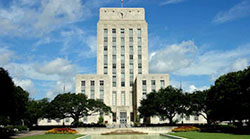Boards and Commissions
Independent Police Oversight Board (IPOB) FAQs
What is the purpose of the IPOB?
1. To create a process to review internal police investigations of possible misconduct by employees of the Houston Police Department (HPD) that involve:
- allegations of excessive force
- discharge of firearms
- serious bodily injury or death
- all other Class I internal investigations, as well as Class II investigations involving mistreatment of citizens
2. To review and make recommendations on recruitment, training and evaluation of police officers
3. To monitor community concerns regarding HPD and report any issues to the Chief of Police.
What is the IPOB’s objective?
To provide a system of increased accountability and transparency and to facilitate resident input into HPD’s internal investigative process.
What is the organizational structure of the IPOB?
- Board consists of 21 members appointed by the Mayor and confirmed by City Council, including one member from each council district
- Five of the appointees, including the Board Chair and four panel chairs, shall possess expertise in criminal justice
- Board divided into four panels of five members each, including Panel Chair. The panel is diverse and with varied expertise and experience
- Members may serve no more than two consecutive three year terms
- Members receive required training by HPD and OIG
- Members may be removed for failure to attend meetings or misconduct.
What are the responsibilities of members on the panels?
Panel members have the following responsibilities:
- Review police department internal investigations to determine if the investigation was sufficient and the conclusions were correct
- Write a recommendation to the Chief of Police on every case reviewed
- Perform additional tasks.
Panel members vote on each matter presented, and each matter is decided by a quorum.
What are the responsibilities of the Administrative Disciplinary Committee (ADC)?
ADC members include the IPOB Chair and Panel Chairs. It is an internal committee responsible for reviewing investigations containing sustained allegations and making a disciplinary recommendation to the Chief of Police.
What are the responsibilities of the Office of Inspector General (OIG)?
The OIG serves as ombudsman for citizens with allegations of police misconduct and to assist, in a confidential manner, regarding the making or filing of a complaint against any HPD officer.
The Inspector General serves as special advisor to the Board and its panels, attends meetings of the panels when requested, monitors the conduct of any additional investigation conducted at request of a panel and meets with the Chief of Police regarding any requests or recommendations for additional investigation.
What happens when the IPOB reviews a case?
Upon completion of an investigation, IAD forwards the file to the designated Board Panel. Upon request of the Panel Chair, a member of the Internal Affairs Division meets with the panel to answer any questions they might have concerning the investigation.
- If a quorum of the members of a panel, in consultation with the Inspector General, decides that additional investigation is needed, the Panel Chair and the Inspector General will meet with the Internal Affairs Division Commander to discuss the panel’s concerns. If the Internal Affairs Division Commander agrees, additional investigation is then conducted.
- If the Internal Affairs Division Commander disagrees, request is made
to Assistant Chief and, if necessary, Chief of Police.
If the Chief of Police disagrees with the panel’s request for an additional investigation, he then meets with the Inspector General in an effort to reach an agreement.
In the event agreement cannot be reached, the Inspector General may conduct such investigation as he/she deems necessary, as authorized by law, to enable the panel to carry out its duties under this Executive Order. Any additional investigation is considered in the panel’s recommendation to the Chief. The panel has 14 days to complete its review of an investigation and make a recommendation to the Chief of Police.






